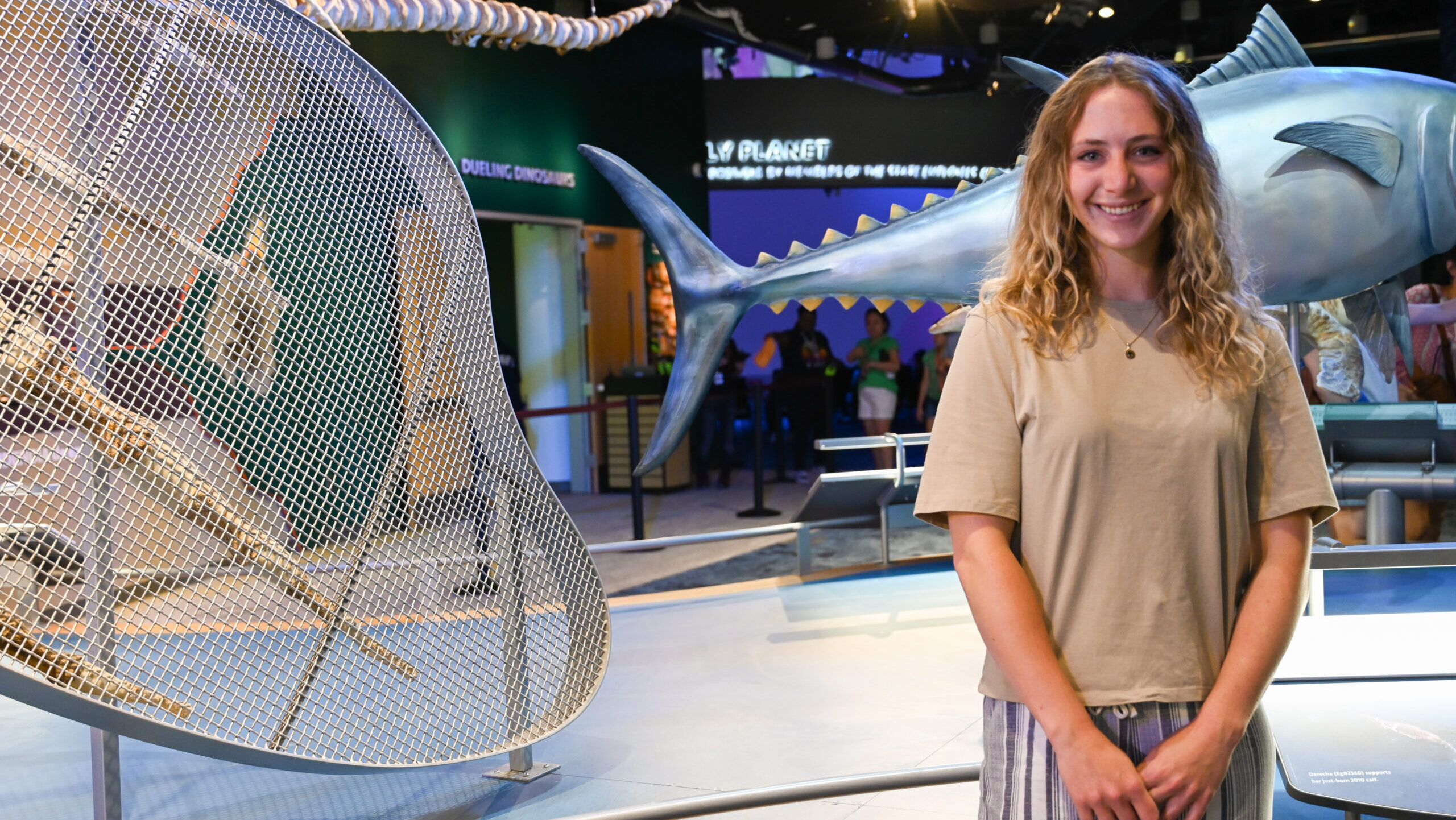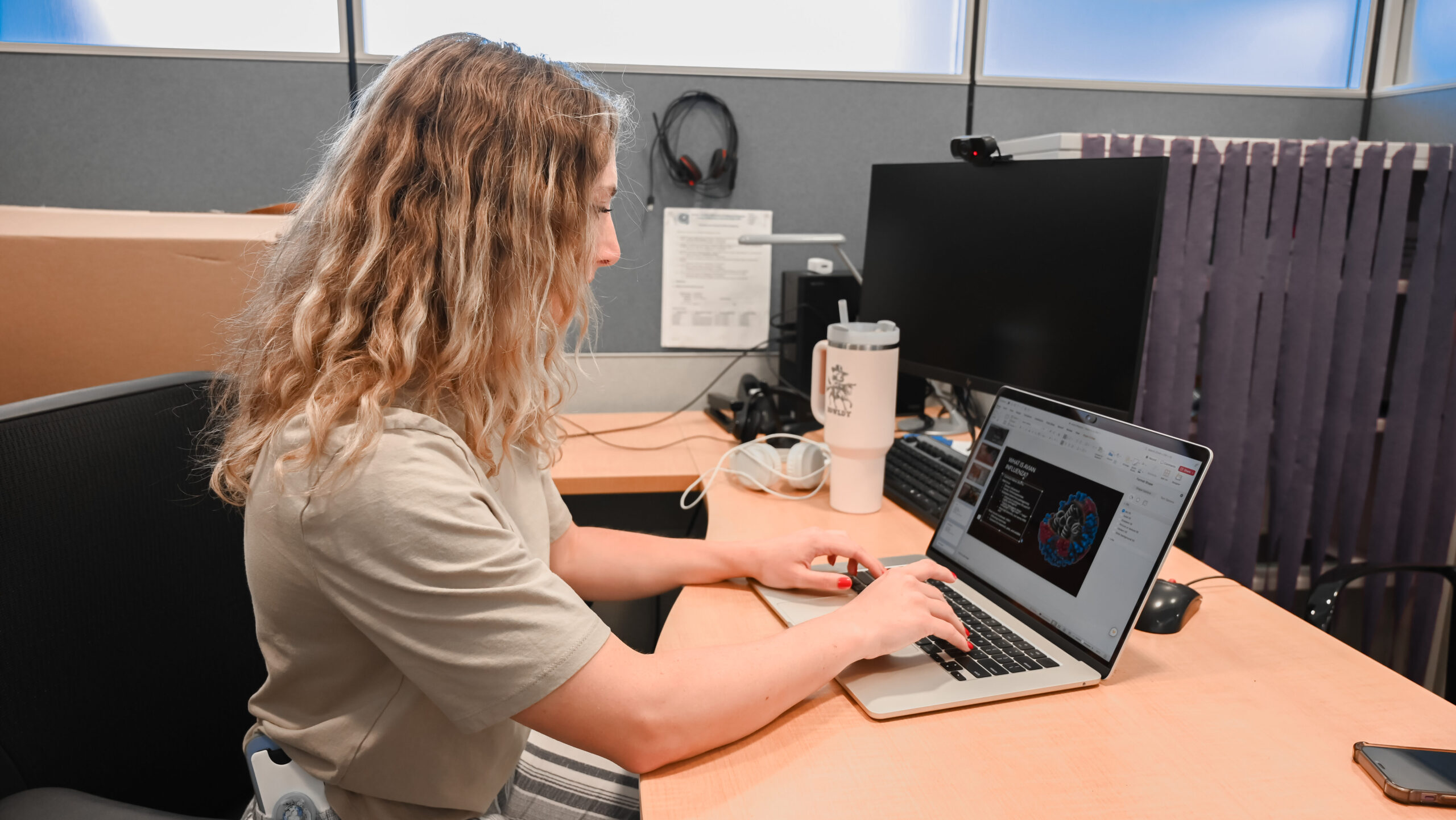A Summer at the Museum: Ashley Cave

Ashley Cave is a DVM/PhD student in the Comparative Biomedical Sciences program at NC State. In the spring, Ashley was offered the Veterinary Sciences One Health Integration Summer Internship at the NC Museum of Natural Sciences. This internship was developed in partnership with the Global One Health Academy and the Museum. We had the chance to visit Ashley on-site to learn more about her research and internship experience.
About Ashley
Growing up on a farm, Ashley Cave was introduced to many One Health concepts, such as farm biosecurity, vaccine protocols, and the environmental impacts of pesticides and herbicides. Having been exposed to these concepts at such a young age, Ashley developed a particular interest in wildlife, the environment, and One Health. During her undergraduate degree, she turned this passion into research, participating in a project investigating the behavioral impacts of herbicide exposure on tadpoles and crawdads. As an undergraduate student, Ashley also had the opportunity to intern at the Columbus Zoo and Aquarium where she studied animal behavior. It was after this internship that Ashley decided to pursue a career in wildlife and related One Health topics. While pursuing her undergraduate degree, Ashley also considered becoming a wildlife biologist before ultimately deciding to pursue a Doctor of Veterinary Medicine (DVM) degree at the North Carolina State University College of Veterinary Medicine (CVM).
As a combined degree student, Ashley is enrolled in veterinary school while also pursuing her PhD. She has completed her first two years of veterinary school and finished up the first year of her PhD this spring. Ashley started off her time at the CVM solely as a DVM student. While in veterinary school, she participated in summer research and contributed to a paper studying Dirofilaria immitis, the parasite responsible for canine heartworm disease, in Galapagos sea lions. After this experience, she decided to pursue her PhD degree in Comparative Biomedical Sciences through the dual-degree program under the advisement of Drs. Matthew Breen and Gregory Lewbart. Ashley is passionate about One Health and education. She strives to explore how environmental health and pollution impacts human and animal health – and to share this knowledge with others. Once she completes her PhD and finishes veterinary school, Ashley hopes to take her expertise into academia where she can continue her research while also maintaining clinical experience.
Educational Modules, Sea Turtles, and More!
As the Veterinary Sciences intern, Ashley works under the supervision of Dr. Daniel S. Dombrowski, Chief Veterinarian & Director of Veterinary Sciences at the Museum. This internship focuses on One Health integration into veterinary sciences operations through opportunities in leadership, program development and implementation, mentorship, public interaction, and presentation.
During her first week on the job, Ashley assisted in the rehabilitation of a Kemp’s ridley sea turtle who had come in for cold stunning, a condition where sea turtles become very weak and inactive from exposure to cold ocean temperatures. Ashley applied topical ointment to the sea turtle and once it had recovered, the sea turtle was released back to its natural habitat.

In addition to saving sea turtles, Ashley spends most of her days on the computer developing original training modules on zoonotic and reportable diseases. These modules will be pre-recorded and accessed online with the intent to offer annual continuing education opportunities while also supporting public outreach and education efforts. “I am really excited to gain experience in designing these educational modules,” states Ashley. “You can do research all day long, but if people don’t understand what it means or how to implement the knowledge, then it won’t be as impactful.”
When she isn’t creating educational modules, Ashley assists with a project investigating pathogen prevalence in frozen mice commercially available to be used as food for snakes and other carnivorous animals under human care. This project is funded by GOHA in partnership with the Museum and the CVM. The team is investigating whether certain pathogens are present in frozen mouse products commonly used by zoos, museums, and people feeding their pets. Insights from this project will serve as a first step in a larger goal of investigating how carnivorous animals in human care may be inadvertently exposed to potentially infectious pathogens.

Through this internship, Ashley has participated in various veterinary science and One Health activities ranging from designing educational modules to rehabilitating sea turtles to participating in research. When asked what she has gained from this experience, Ashley replied, “One thing I have appreciated is the collaboration between the different parts of the Museum and between the Museum and the CVM. It is really beneficial to be in an environment where you have experts in various disciplines that are excited to work together.” Ashley is grateful for the knowledge and experience gained from this internship and hopes to apply these skills in her PhD, DVM, and her future career.
- Categories: